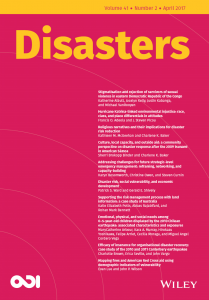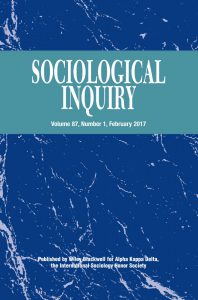Readiness for independent living of youth in residential childcare: A comparative study

Transition to adulthood has become an increasingly extended and complex period for young people, which is not usually completed until the late twenties in most European countries. However, for people who have been placed in alternative care during their childhood or adolescence after being separated from their families of origin, this process is especially difficult. In addition to their early adverse experiences (such as neglect, abuse, abandonment, etc.), they are usually forced to face a much more abrupt and compressed process of transition to independent living. This process usually starts when they reach 18 years old, when the childcare placements are ceased and require them to become independent quickly (secure a job, maintain their own home, gain personal autonomy).
These disadvantages are especially relevant in countries in which the emancipation from the family home is even more delayed. This is the case in Spain where, as in other Southern-European countries, young people are not leaving their family homes until they are 29 or 30 years old, on average (EUROSTAT, 2021). Although there are no official data, it is estimated that up to 5.000 young people move out of out-of-home care each year in Spain at the age of 18, being able to access very different levels of support depending on their situation and the region they are living in (Observatorio de la Infancia, 2020). Transition to adulthood will imply a greater number of challenges for most care leavers in critical areas for successful emancipation, such as education or employment, leading them to poorer outcomes and greater difficulties in reaching social integration and well-being (Gypen et al., 2017).
To overcome these risks, the international research community agrees on the importance of providing care-experienced young people with adequate preparation for leaving care and tailored support until they become fully independent (Harder et al., 2020), which has not been recognized by Spanish national laws until 2015. These kinds of interventions usually referred to as “independent living programs, ILPs” are designed to help young people in care develop the key independent living skills (ILS) necessary for life (e.g., budgeting, household management, job skills, etc.). Although participating in these programs has been related to some degree of positive outcomes for young people (Woodgate et al., 2017), the assessment of the direct perceptions of improvement on young people’s ILS is rarely reported in their evaluations. In fact, only a handful of studies have addressed this issue (see Häggman-Laitila et al., 2019), despite its potential as a measure of performance for these interventions. In fact, the tradition of measuring ILS in care-experienced young people is quite limited, as only a few instruments have been designed and used for it (e.g., Casey Life Skills Assessment) and even fewer have been studied at a psychometric level.
When these instruments have been used, the general conclusion has been that young people in care tend to perceive themselves with high levels of life skills (Benbenishty & Schiff, 2009; Casey et al, 2010), which contrasts with the gloomier perceptions of parents or caregivers when they are asked (Trout et al., 2014). However, such perceptions have never been tested against those of non-care-experienced young people, given that ILPs will be trying to promote a higher level of ILS in care-experienced people than their peers at the same age.
The aim of this piece of research was to fill this gap in research by comparing the perceived readiness for independent living of a group of care-experienced young people in Spain with that of their peers from the general population without an alternative care experience. The study was guided by the following research questions:
- Do care-experienced young people feel more skilled and prepared to cope with independent living than their peers without the prospect of early emancipation?
- Do these differences vary according to age?
- Which variables are best predictors of perceived ILS?
- Do they differ between care-experienced young people and their peers from the general population?
For this, 508 young people aged 14-17 living in Spain participated in this study, divided into two groups: 279 care-experienced young people living in children’s homes or supported accommodation for care leavers and 229 young people from the general population as a comparison group. They did not differ in their age and gender throughout the groups. Participants were asked to answer a brief online survey that included the following tests:
- PLANEA Independent Life Skills Assessment (García-Alba et al., 2021): allows for assessing the perceived level of ILS (their perceived ability to perform certain tasks) and personal autonomy (their actual degree of autonomy in performing certain tasks) of young people. It is a recently validated instrument used in Spain along with PLANEA Program: a web-based tool that residential childcare workers can use to promote young people’s ILS and autonomy in children’s homes (Del Valle & García-Alba, 2021; see www.proyectoplanea.com).
- General Self-Efficacy Scale (Sanjuán et al., 2000): it assesses the belief in the capacity of one’s actions to achieve specific outcomes. High self-efficacy can be protective, but several authors have acknowledged how this can be negatively impacted by childcare environments.
- Participant’s basic data profile characteristics: a brief set of questions that outlined participants’ sociodemographic profile, including age, gender, occupation, studies, and work experience. In addition, care workers completed a questionnaire about each young person in the care-experienced group about their placement’s characteristics.
After analyzing the data, we confirmed what has already been systematically found by previous research regarding educational background (Montserrat et al., 2015). Care-experienced young people were less likely to be studying and pursuing higher education beyond the age of compulsory education (16 years old in Spain) than their peers. The proportion of care-experienced young people who were not in employment, education, or training (NEET) was higher (7.9%) than in the general population (3.6%) and reached 16% in the age range 18-21. No differences were found regarding work experience rates between the groups.
Regarding their perceived levels of ILS, care-experienced young people did not differ in their total scores from the comparison groups, but they did feel more skilled in some of the domains. First, they found themselves more skilled to engage in behaviours measured by PLANEA’s Self-Care and Well-Being subscale, including those related to healthy lifestyle and risky behaviour avoidance (e.g., using contraceptive methods, eating healthy and use of leisure time) and self-care and everyday life skills (e.g., cleaning, cooking, and personal hygiene). The same trend was observed in greater measure for the skills related to finding a job and living independently according to their higher scores in PLANEA’s Employment and Accommodation subscale (e.g., writing a CV, finding a place to live and budgeting). These results are consistent with their levels of personal autonomy, as care experienced young people reported being more autonomous to perform tasks related to daily life skills at home (e.g., cooking, cleaning and doing the laundry). Previous studies have also found that young people in care feel more skilled in these domains, which are also the most frequently addressed in transitional support services and ILPs (Casey et al., 2010; Dinisman & Zeira, 2011; Trout et al., 2014).
In contrast, no differences were found between the groups in their skills related to making daily arrangements in the community (e.g., making doctor appointments, filling applications, and making purchases). We hypothesize that these areas could be under-addressed in residential childcare for the benefit of more practical areas.
Participants’ gender did not influence the different levels of ILS and personal autonomy between the groups. However, girls felt more skilled and autonomous than boys regardless of their group in the domains related to autonomy in the home (doing chores, eating healthy, etc.). These results in the childcare context can be compared with previous studies that also found girls feeling more prepared to take care of themselves (Huscroft-D’Angelo et al., 2013), but other studies have found no differences in that area (Casey et al., 2010). This could also reflect adolescents’ early assumption of traditional gender-based roles that assign women more responsibilities in health care and daily life tasks at home, which has been observed early in adolescence, with girls dedicating more time to domestic work and personal care than boys (Gracia et al., 2021). Such findings point out to the importance of using a gender perspective in future studies regarding preparation for leaving care and perceived life skills.
Regarding self-efficacy, care-experienced young people showed lower levels than their peers in the general population, which is consistent with previous literature suggesting that being placed in care could affect the development of self-efficacy and self-esteem due to the perceived constraints and powerlessness of young people’s acts and decisions over their lives (Hokanson et al., 2019; Stein, 2005). However, this difference was only found in the 16-17 age cohorts, reflecting maybe the amplification of young people’s fear and stress during the months before leaving care, as Crous et al. (2020) documented.
Finally, we observed that self-efficacy and personal autonomy were very closely related to the level of ILS in both groups, but work experience made a significant contribution only for the care-experienced group. These results support that engaging in ‘hands-on’ activities and real-world experiences before leaving care and as part of leaving care support services could be key for promoting a real change in young people’s ILS, agency and self-efficacy (Dinisman & Zeira, 2011). Particularly, early work experiences seem to have a crucial impact on their development of social capital, improving their opportunities for a future successful employment career and also higher educational attainment (Arnau-Sabatés & Gilligan, 2020; Hook & Courtney, 2011).
To our knowledge, this study has been the first to compare care-experienced young people’s assessments of their life skills and personal autonomy with those of their peers without a childcare background. Several implications for policy and practice can be drawn from our study. First, the importance of assessing perceived ILS as an outcome of interventions to promote young people’s preparedness for leaving care is highlighted. Second, our study supports the critical role of out-of-home care placements in providing young people in care with opportunities to develop their autonomy and life skills not only between the walls of the children’s homes but also through real-life activities, such as early work experiences in the community. Finally, opportunities for participation in decision-making processes related to young people’s pathway for leaving care should be carefully promoted, considering its key role in the development of a sense of self-efficacy and agency in care leavers.
For more information and the full list of references, please check our Open Access publication at Child & Family Social Work:
García-Alba, L.; Gullo, F., & Del Valle, J. F. (2022). Readiness for independent living of youth in residential childcare: A comparative study. Child & Family Social Work, 1-13. https://doi.org/10.1111/cfs.12951.





1099-0860/asset/NCB_logo.gif?v=1&s=40edfd0d901b2daf894ae7a3b2371eabd628edef)
